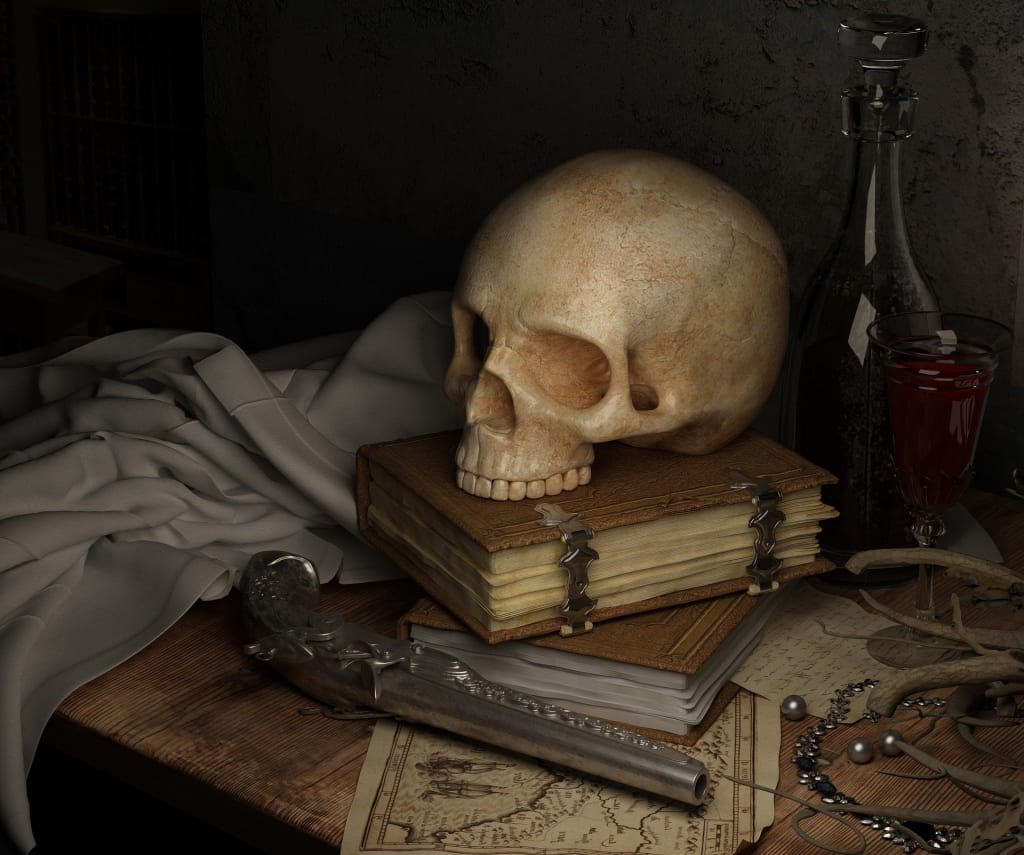What Education Did Your RPG Character Receive?
And At What Price?

"We can't stay here," Tibald snarled, hammering a fist on the inn's table. "Those things from the caves are coming in force! If we stay here, they'll slay us all!"
"And what would you have us do, hmmm?" Shevan demanded, folding her arms over her chest. "Run? Leave our homes and anything we can't carry for them to take without a fight?"
"We won't be able to hold our walls," Tibald said. "There's too many of them. They'll swarm over us!"
"No they won't," a voice from the corner of the tavern said.
All eyes turned to the man sitting on a high stool. He took a long sip from his tankard, and belched. Wrapped in boiled leather, with a pair of heavy daggers on his belt, he was unwashed, unshaved, and uncouth. But there was something in his eyes that said this wasn't an idle boast.
"Oh, forgive me," Tibald said, directing a mocking bow toward the man. "I forgot we have a warrior of legend in our midst. Surely you'll save us all from this menace, and we can just go home."
The man set his tankard aside, and stood. He wasn't particularly imposing, but there was something about him that made people shrink back. It may have been the scars along his arms, or the black tattoo on the back of his hand, but as he approached the table where the town had been discussing their strategy for dealing with the encroaching goblin threat, everyone fell silent. He studied the map for a moment, lips pursed.
"We lay pitfalls here, here, and here," he said, touching the map in rapid succession. "Block roads along these areas with deadfalls. Gannard, you said there was fish that wouldn't keep?"
"I... I did yes," the fisherman said, his eyes widening at being addressed.
"We can't eat it, so we use it as bait. Worst case scenario, the little bastards slow down and fight over it. Best case scenario, it draws something bigger. If there's any bear musk, spray the area where we leave the fish to make sure the area is dangerous."
He spoke clearly, waving his hands across the map, and pointing out strategic locations. The confidence of his words made it sound like he was merely describing what would happen, instead of what might happen.
"We lay out pitch here, here, and here, creating concentric rings. We station archers in these separate locations with additional shafts, and fleet horses should they need to reposition. Once the goblins attack, and they're within the rings, we light them. Trapped between the flames, they either run toward the spears on the wall, or try to reach the archers outside the fire before being shot down, or burned to ash."
The room was quiet for a long moment. The townsfolk looked at each other, then at the mercenary who'd laid out the plan. Shevan frowned at him, clearly re-evaluating something.
"And how do you know this will work?" she asked.
"It's called the Burning Anvil," the soldier of fortune said. "It's how General Kalmund Gord defeated the Bogwen Trolls at the Battle of Broken Pass."
"And how the hell did you know that?" Tibald asked, his forehead furrowing.
"I graduated the Lions Academy in Karracun," the mercenary replied. "Now, are you all just going to stand around? We have preparations to make!"
You Had To Learn Somewhere
Education is a practice as old as humanity. With that said, when most of us hear the word, we tend to think of modern forms of education. Because the idea that all children are brought to a communal learning place where they're taught the basics of reading, writing, and arithmetic, then they go to university in order to finish their education and prepare themselves for a career is a relatively new concept... but that's only one form education has taken over the years.
And because a lot of us have this idea that people were stupid in the past (they really weren't), we just assume that fantasy games based of the so-called Dark Ages would just be a slew of backwater beliefs and ignorance. However, most of these same settings have huge libraries, great colleges of learning, guild halls, military academies, monastic orders, and dozens of other ways one might get an education.
So it's often worth asking where your character got their education... because you might find some really unique, or unusual answers to this question. And you should do this with every character, not just wizards, clerics, and paladins (which tend to be the most common classes to have received some kind of formalized education).

As an example, consider some of the following places where your characters may have been taught about philosophy, magic, or practical skills, like:
- Open Air Lectures: Whether held in parks and squares, or taking place in coffee houses, any place where people regularly held forth on academic matters could very well act as free, open-air classrooms.
- As An Apprentice: A 1-on-1 teaching relationship with a master, this is often the way one learns a trade from an experienced professional, or as a member of a guild. If you're looking for inspiration, check out 100 Fantasy Guilds for this option, as well as 100 Sci Fi Guilds.
- Monastic Training: From chained libraries where one might study ancient texts, to the proverbs explained by elders, monasteries are often places of learning. Whether one is born there, left there as a child, or whether they journey there in search of wisdom, one may learn skills and secrets within.
- University: Traditional universities are older than we often realize in our world, and fantasy settings tend to be filled with these institutions. Whether they specialize in arcane studies, musical composition, or war and military strategy, these places are centers of learning that may cater to all kinds of studies.
- Religious Institutions: Whether it was an orphanage run by a church, or you were taken in by the clergy and taught the necessities of faith along with the skills to perform various duties, one may find a mix of the practical and the mystical here. For those seeking examples, 100 Cults to Encounter as well as Cults of Sundara (DND 5E and Pathfinder versions) have several examples. There's also 100 Sci Fi Cults, for those playing games set in the far future, or the very distant past!
- Secret Societies: These groups often have all kinds of agendas, but members may be taught particular skills, or learn certain truths that are concealed from the general populace. Unique languages, spycraft, or even closely guarded magical rituals might all be learned in this way. Those seeking inspiration might want to check out 100 Secret Societies.
- Military Training: Whether it's as a member of a militia, or a sworn sword of a knightly order, those who are trained to fight are often taught a variety of other skills as well. From fieldcraft, to code languages, to trap snaring, and strategy, there's a lot that goes into being a soldier, sailor, etc. For those seeking inspiration, check out both 100 Knightly Orders, or 100 Random Mercenary Companies. For those playing games in sci-fi settings, there's also 100 Sci Fi Mercenary Companies, and the latest release 100 Knightly Orders For a Sci Fi Setting.
This isn't an exhaustive list, of course. Nor does it include things like independent study and experimentation, learning from parents, grandparents, and siblings, summoning devils and angels for their knowledge, finding wandering wizards or hermiting druids to teach you, or the private tutors one might hire if one happens to be a member of a powerful family, a royal bloodline, and so forth.
At the end of the day, however, just like all of our characters had to be raised by somebody, all of them had to pick up their skills and knowledges somewhere. And this component is often forgotten about (or at least not examined very deeply) when we're putting their histories together. So take a moment, and ask yourself how your character learned what they know.
Like, Follow, and Stay in Touch!
That's all for this week's Fluff post!
For more of my work, check out my Vocal archive, and stop by the YouTube channel Azukail Games, where I share a lot of video content. Or if you'd prefer to read some of my books, like my sword and sorcery novel Crier's Knife or my recent short story collection The Rejects, then head over to My Amazon Author Page!
To stay on top of all my latest releases, follow me on Facebook, Twitter, and now Pinterest as well! To support my work, consider Buying Me a Ko-Fi, or heading over to The Literary Mercenary's Patreon page to become a regular, monthly patron. That one helps ensure you get more content, and it means you'll get my regular, monthly giveaways as a bonus!
About the Creator
Neal Litherland
Neal Litherland is an author, freelance blogger, and RPG designer. A regular on the Chicago convention circuit, he works in a variety of genres.
Blog: Improved Initiative and The Literary Mercenary
Reader insights
Outstanding
Excellent work. Looking forward to reading more!
Top insights
Compelling and original writing
Creative use of language & vocab
Easy to read and follow
Well-structured & engaging content
Excellent storytelling
Original narrative & well developed characters
Expert insights and opinions
Arguments were carefully researched and presented
Masterful proofreading
Zero grammar & spelling mistakes
On-point and relevant
Writing reflected the title & theme






Comments (5)
Excellent article as usual. There was a whole campaign based on your introduction story with a goblin horde invading and the major city trying to stop from being overrun. The PCs were heroes who planned the defense. It started out as a Facebook group and was good for a while then it just fizzled as many games do. The author of the Facebook group stopped contributing stories about what his players were doing because they stopped playing and the game and the resulting Facebook group just up and died after that. Education has become an important facet of the game. In 1st and 2nd edition players quickly memorized the monster manual and often could recite the monster's stats faster than the GM. This meant they knew the strengths and weaknesses of the monsters, without having to put any character skin into the game. The introduction of Skills started to change that. 3rd edition pilled onto the idea of skills and gave out more skill points and had a list of skills that the players could get for their characters. Now knowledge was limited, the pendulum had swung the other way. Can an Medusa stone you with a glance like a Basilisk. Well, to answer that question you needed the right knowledge and have to make a Skill Check against that Knowledge to see if you can get the information that is important to your character's survival. But, this doesn't cover everything. For example a peasant could be lucky if they could do their sums, whereas the nobles were memorizing multiplication tables and the philosophers were debating topics like the Pythagoras Theorem or other Greek discoveries. Often this type of knowledge isn't covered by the basic knowledge skills and ignored. But then if a player wants to know the distance to send their fireball and they know the length and width of the room, they will ASSUME that their character can calculate the hypotenuse and so know how far to shoot that fireball, when that knowledge was actually restricted to those who had the extra time to learn it, the noble class and even then it would only be the rich nobles who could hire expensive tutors who would know all that. Now we all assume that wizards are knowledgeable and have a lot of book learning, but what constitutes this book learning and how is it expressed in the game? Is it all a Knowledge (Nobility) check, do you try to bend existing Knowledges into service, or do you make up a Knowledge (Math) for this ability? The answer lies somewhere in the character's background. Those who had the opportunity to be schooled would know some of this and those who did not would lack it. This also depends on the timezone that you put your campaign in. In the Dark Ages knowledge was kept in dark corners of the world and not spread around. Most campaigns take place somewhere in the Middle Ages, which covers a wide expanse of history and was a time of change. Peasants may not have been educated, but members of the new middle class were. In the Renaissance period some of that education was formalized into schools where the public could attend, at least for the first few grades. You still had to be a noble to get what we would call a college degree, but more people were educated and smart and the modern idea of grade, middle and high school got its start. As our economic situation and wealth improved so did our education standard. So, when starting your game decide what time period you plan on using and what was generally known in that time period. I like to have intelligent players and smart characters as well as an advanced technology, so personally, I set all my games in the Renaissance period or later. That means that there is some schooling for the general population and so some common knowledge that is not reflected in the standard Knowledge skills that would be known; like the theory of Pythagoras (and here you thought you wouldn't need to use advanced math in the "real" world).
Wonderful
Wonderful
Excellent article as usual. Prior to 3rd edition the education of the character was assumed to be the education of the player and it was possible to memorize large patches of the Monster Manual. That meant when you came across a monster, like a vampire, a whole lot of people knew its strength's and weaknesses and how to defeat it. Editions after 2nd had skills and knowledges and you character was assumed to be an idiot until they got some picks in a knowledge; for example to read a map took a pick in Knowledge (Geography). To know about a monster required the proper knowledge check; oozes and slimes were Knowledge Dungeoneering and Giants were Knowledge Local. The idea of people being near idiots came from the dark ages when most knowledge was isolated to a city or village and only an occasional traveler to shed some light, this is when bards became real important because they often brought news of the outside world. Advance in time to the Middle Ages and the lower classes are idiots, while the upper class can expect some sort of formal education given by a tutor in small classrooms. Advance to the Renaissance and public education became a thing and more and more people got some sort of education, with the nobles getting more of an education and the formation of colleges and universities to become places of higher education. I like to place my games in the Renaissance era, but a lot of DMs like the Middle Ages or earlier. The earlier you go the less knowledge the general public has. Exceptions exist for the Greek and Romans and other cultures like the Egyptians, but a lot of that knowledge has been lost to the ages. Like during the burning of the Great Library of Alexandra. We have dozens of Greek Tragedies when hundreds were written and performed. You may not think of a play as having a lot of knowledge in it, but they spread the common mythology of the time and general knowledge about society. So my question becomes this; what do your players and your characters know and how do you control the bleed factor from player knowledge to character knowledge? If you assume a basic education level then you need to specify what it is and what it covers. If you assume that a character needs knowledge skill picks to have any knowledge then you can run it that way and it is easier, but it means that coming out of the docks most 1st level characters are morons. Skipping games a bit another area of knowledge is in Vampire the Masquerade. Vampires are considered to be mythological and repelled by salt, this is common knowledge, seeded as part of the Masquerade. To know the truth about vampires you need picks in Occult. Now this may have been unique to the Storyteller I was running under or common to the game, it is hard to pin down since there are several versions of the game and many source books. One reason why I am not a fan of Vampire the Masquerade is that you have too many source books to keep track of, more than in any edition of D&D.
Forget about a liberal arts degree, my RPG character went straight to the School of Epic Loot and Critical Hits, although they failed out and are now in crippling debt.